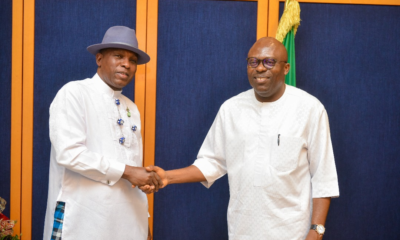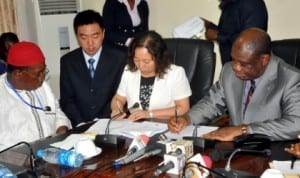Oil & Energy
When Will Nigerians Enjoy Stable Electricity?
Unarguably, the provi
sion of stable and uninterrupted power supply is key for accelerated economic and industrial development of any country. Analysts are quick to point out that Nigeria’s quest to become one of the 20th economies in the world may as well be a mirage without stable electricity supply.
They say that stable electricity supply will reduce the cost of manufacturing and services; boost investment and employment, among others.
However, in spite of its importance, efforts to guarantee sustainable stability in the power supply chain has remained elusive despite huge investments in the sector by successive administrations since independence.
For instance, available records showed that the Olusegun Obasanjo’s government spent over three billion dollars on its National Integrated Power Project (NIPP) as at 2007. This, according to Gov. Gabriel Suswam of Benue, the Chairman, Joint Transaction Technical Committee, is out of the over 10 billion dollars earmarked for the NIPP.
He said that the amount was also inclusive of the two billion dollars Federal Government’s counterpart funding for Mambilla Hydro Power project and the 1.4 billion dollars set aside for additional nine turbines plants.
At the moment, four of the projects which on completion would generate 4,774MW, had been completed, while six others are at 80 to 90 per cent completion.
To further boost the initiative, the President Goodluck Jonathan’s administration has strengthened the power sector reform by fully privatising the Power Holding Company of Nigeria (PHCN).
The exercise eventually resulted in the unbundling of the PHCN and the establishment of power Distributing Companies (DISCOs) across the country.
Although the reform is yet to significantly improve power stability nationwide, the World Bank, however, applauded the government for the initiative, with a call on other African countries to emulate the policy.
Mr Mukhtar Diop, the bank’s Vice President, Africa, made the commendation while listing some infrastructural achievements in Africa, during the recent African Union Summit on Financing Infrastructure Development, in Dakar, Senegal.
According to him, the power reform is one of the ways of solving Africa’s problems by Africans. “We must commend the leadership in Nigeria for the successful completion of the privatisation of the country’s power sector. “The electric reform in that country is one of the ways of solving Africa’s problems by Africans. We commend the country for that.”
It is, perhaps, against this backdrop, that President Goodluck Jonathan promised to restore uninterrupted power supply to Nigerians by the end of 2014.
Jonathan gave the assurance while commissioning the NIPP 500MW Omotosho II Power Station at Omotosho in Okitipupa Local Government Area of Ondo State.
He said that his optimism was based on the progress in the completion of the ongoing 10 independent power projects spread across the country.
“My administration is committed to boost electricity supply in the country. Today, we are in Ondo State to commission Omotosho Power Plant that will also serve the people of these areas and improve electricity supply in the country.”
But in spite of the government’s assurances, pundits doubt that uninterrupted and stable power supply to Nigerians would be achieved by the end of 2014.
Mr David Ladipo, whose company, Azura, is spending 700 million dollars to build a 450 MW plant in South Africa, insists that with the situation on ground, it will still take Nigeria 50 years from now to enjoy stable power supply.
Ladipo told Reuters news agency that Nigeria would need about 140,000MW to guarantee stable power supply.
‘’Nigeria is still scores of years away at this threshold. At present, it generates a meagre 4,000 MW for a population estimated at 170 million.
‘’South Africa, with a population of about 50 million people, produces about 40,000 MW of electricity and has been trying in recent years to increase output.
“It will probably take Nigeria another 50 years before it attains the same level of electricity consumption per capita as South Africa currently enjoys today,” Ladipo said.
However, Gov. Babatunde Fashola of Lagos State believes that with patience and commitment, Nigerians will soon enjoy the dividends of the ongoing power sector reforms.
Fashola expressed the optimism in Lagos at the closing ceremony of the 7th Lagos Economic Summit, tagged: Ehingbeti. According to him, the privatisation of the power sector will not be successful without the cooperation of investors and consumers.
He urged the public to develop energy conservation culture and manage existing power infrastructure adequately. “We should desist from illegal connections of electricity and ensure that our bills are paid appropriately.
“Electricity poles should not be used as speed breakers by reckless drivers; we should all protect the infrastructure from being damaged,’’ the governor said.
The Minister of Power, Prof. Chinedu Nebo, shares similar sentiments, noting that the Federal Government has concluded plans to explore ways of implementing the Indian power sector model in order to further boost the nation’s capacity to generate more power.
Nebo stated this recently in Abuja when he received a delegation on power from India.
The minister said that the Nigerian power sector which was still in a transitional stage after the privatisation still had a lot to learn from the Indian experience.
According to him, this is because of the peculiarity between both nations’ power sector. He said the ministry would soon summon a stakeholders’ forum of all Generating Companies (GENCOs), Distribution Companies (DISCOs) and the regulatory bodies to take a closer look on how India transformed its power sector.
Nebo also invited the Indian delegation to the first National Council on Power conference slated for August 2014 in order to have a robust discussion.
The minister assured the delegation that the Federal Government was committed to achieving 10,000 MW by the end of the year despite the challenges.
Speaking on behalf of the DISCOS, the Chief Executive Officer of Eko Disco, Mr Oladele Amoda, said the company had already had a technical arrangement with Tata of India.
He urged the India delegation to take seriously the issue of transfer of technology so as to fast-track the development of the sector.
The Indian High Commissioner to Nigeria, Mr Ajjampur Ghenashyam, who also spoke, advised Nigeria, as the hub of economic activities in the West African sub-region, to take the lead in the development of regional power market.
He said that India had achieved over 400 per cent leap in generation capacity in the last 10 years due to the competitiveness of the market.
Ghenashyam said countries like Nepal, Bangladesh, Bhutan and Pakistan had already been enjoying from seamless cross-border market and this had further boosted confidence for investment flow into the sector.
The envoy said that India was ready to partner with Nigeria in the development of the nation’s power sector.
Nonetheless, analysts have advised the government to also invest in the development of alternative sources of energy, such as wind and solar in order to boost the capacity of the country to meet its energy requirement.
They also advise the government to fast-track the completion of the NIPP projects in order to realise the objective of providing uninterrupted power supply to Nigerians by the end of 2014.
Mr Adamu,writes for News Agency of Nigeria (NAN).
Sani Adamu
Oil & Energy
FG Explains Sulphur Content Review In Diesel Production
The Federal Government has offered explanation with regard to recent changes to fuel sulphur content standards for diesel.
The Government said the change was part of a regional harmonisation effort, not a relaxation of regulations for local refineries.
The Chief Executive, Nigerian Midstream and Downstream Petroleum Regulatory Authority (NMDPRA), Farouk Ahmed, told newsmen that the move was only adhering to a 2020 decision by the Economic Community of West African States (ECOWAS) which mandated a gradual shift to cleaner fuels across the region.
Ahmed said the new limits comply with the decision by ECOWAS that mandated stricter fuel specifications, with enforcement starting in January 2021 for non-ECOWAS imports and January 2025 for ECOWAS refineries.
“We are merely implementing the ECOWAS decision adopted in 2020. So, a local refinery with a 650 ppm sulphur in its product is permissible and safe under the ECOWAS rule until January next year where a uniform standard would apply to both the locally refined and imported products outside West Africa”, Ahmed said.
He said importers were notified of the progressive reduction in allowable sulphur content, reaching 200 ppm this month from 300 ppm in February, well before the giant Dangote refinery began supplying diesel.
Recall that an S&P Global report, last week, noted a significant shift in the West African fuel market after Nigeria altered its maximum diesel sulphur content from 200 parts per million (ppm) to around 650 ppm, sparking concerns it might be lowering its standards to accommodate domestically produced diesel which exceeds the 200 ppm cap.
High sulphur content in fuels can damage engines and contribute to air pollution. Nevertheless, the ECOWAS rule currently allows locally produced fuel to have a higher sulphur content until January 2025.
At that point, a uniform standard of below 5 ppm will apply to both domestic refining and imports from outside West Africa.
Importers were previously permitted to bring in diesel with a sulphur content between 1,500 ppm and 3,000 ppm.
It would be noted that the shift to cleaner fuels aligns with global environmental efforts and ensures a level playing field for regional refiners.
Oil & Energy
PHED Implements April 2024 Supplementary Order To MYTO
The Port Harcourt Electricity Distribution (PHED) plc says it has commenced implementation of the April 2024 Supplementary Order to the MYTO in its franchise area while assuring customers of improved service delivery.
The Supplementary order, which took effect on April 3, 2024, emphasizes provisions of the MYTO applicable to customers on the Band A segment taking into consideration other favorable obligations by the service provider to Band A customers.
The Head, Corporate Communications of the company, Olubukola Ilvebare, revealed that under the new tariff regime, customers on Band A Feeders who typically receive a minimum supply of power for 20hours per day, would now be obliged to pay N225/kwh.
“According to the Order, this new tariff is modeled to cushion the effects of recent shifts in key economic indices such as inflation rates, foreign exchange rates, gas prices, as well as enable improved delivery of other responsibilities across the value chain which impact operational efficiencies and ability to reliably supply power to esteemed customers.
“PHED assures Band A customers of full compliance with the objectives of the new tariff order”, he stated.
Ilvebare also said the management team was committed to delivering of optimal and quality services in this cost reflective dispensation.
The PHED further informed its esteemed customers on the other service Bands of B, C D & E, that their tariff remains unchanged, adding that the recently implemented supplementary order was only APPLICABLE to customers on Band A Feeders.
Oil & Energy
PH Refinery: NNPCL Signs Agreement For 100,000bpd-Capacity Facility Construction

The Nigerian National Petroleum Company Ltd (NNPCL) has announced the signing of an agreement with African Refinery for a share subscription agreement with Port-Harcourt Refinery.
The agreement would see the co-location of a 100,000bpd refinery within the Port-Harcourt Refinery complex.
This was disclosed in a press statement on the company’s official X handle detailing the nitty-gritty of the deal.
According to the NNPCL, the new refinery, when operational, would produce PMS, AGO, ATK, LPG for both the local and international markets.
It stated, “NNPC Limited’s moves to boost local refining capacity witnessed a boost today with the signing of share subscription agreement between NNPC Limited and African Refinery Port Harcourt Limited for the co-location of a 100,000bpd capacity refinery within the PHRC complex.
“The signing of the agreement is a significant step towards setting in motion the process of building a new refinery which, when fully operational, will supply PMS, AGO, ATK, LPG, and other petroleum products to the local and international markets and provide employment opportunities for Nigerians.
By: Lady Godknows Ogbulu
-
News3 days ago
FG Flags Off PH-Aba Train Service
-

 Featured3 days ago
Featured3 days agoDraw Up Futuristic Policies To Strengthen Governance, Fubara Tells NISS Team …Says Rivers’ll Deploy AI To Drive Dev, Tackle Political Crisis
-
News3 days ago
Drama As Senators Jostle For Seats In Newly Renovated Chamber
-

 Niger Delta3 days ago
Niger Delta3 days agoDiri swears in 14 Commissioners, Revenue Chairman
-

 Nation3 days ago
Nation3 days agoVCDF in Partnership with LDSVA Sensitise Women on Gender Equality, Financial Literacy & Entrepreneurship
-

 Niger Delta3 days ago
Niger Delta3 days agoObaseki Approves N70,000 Minimum Wage For Workers
-
Niger Delta3 days ago
Ministry Of Health Decorates Odu As End Malaria Champion In Rivers
-

 Niger Delta3 days ago
Niger Delta3 days agoGroup Dismisses Call For NDDC MD’s Sack … Passes Confidence Vote.


